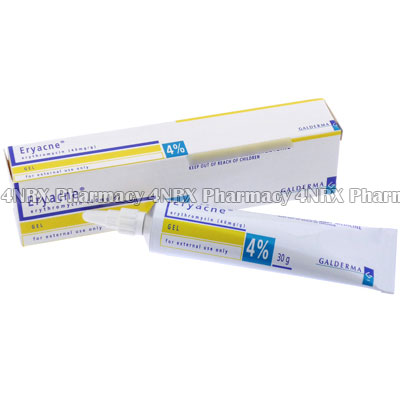 |
Home  Skin Skin  Eryacne Gel (Erythromycin) Eryacne Gel (Erythromycin) |
|
|||||||||
|
|
Eryacne Gel (Erythromycin)
What is Eryacne Gel (Erythromycin) used for? Eryacne Gel (Erythromycin) is a topical antibiotic prescribed to treat acne. The gel contains a macrolide antibiotic that destroys or slows the reproduction of bacterial cells on the skin to make it easier for the immune system to control the infection naturally. Your physician may also prescribe this medication to treat other unlisted conditions. How should I use Eryacne Gel (Erythromycin)? Use Eryacne Gel (Erythromycin) according to your physician's instructions to get the most effective results from treatment. The gel is normally administered to the affected area of skin twice each day; once in the morning and again just before going to sleep. Thoroughly rinse and dry your face before use to remove any dirt or loose skin. You may also be instructed to use a cotton swab or other applicator to prevent the spread of the infection. Wash your hands with soap and water following each administration to prevent it from contacting any areas not being treated or the mucous membranes. It should be noted that several weeks of regular application may be required before the desired effects of treatment are seen. What are the side effects of Eryacne Gel (Erythromycin)? Some patients using Eryacne Gel (Erythromycin) may experience side effects such as:
Stop using the gel and contact your physician immediately if you experience any severe side effects such as intense skin reactions, oozing, or blistering skin. These conditions may require reduced application frequency or immediate medical attention in more serious cases. Please Note Do not begin using Eryacne Gel (Erythromycin) if you are allergic to erythromycin or if you have had a bad reaction to similar treatments in the past. Strictly follow all instructions provided to you by your physician or pharmacist while using Eryacne Gel (Erythromycin). Optimum and safe dosage can differ based on the patient and the condition being treated. As this medication may be unsafe for certain patients, it is essential you always inform your physician if you are pregnant or breastfeeding, as well as if you have any allergies, other illnesses, or ongoing health conditions, and if you are taking any other form of medication, supplements, or herbal products. Immediately seek emergency medical care if you have any allergic or hypersensitive reaction. Common signs of a reaction include hives, swelling, skin rashes, chest pains, as well as trouble breathing or swallowing. 
|
||||||||||||||||||||||